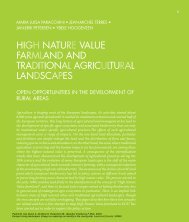The Terraced landscapes of The MalTese Islands - Landscape Europe
The Terraced landscapes of The MalTese Islands - Landscape Europe
The Terraced landscapes of The MalTese Islands - Landscape Europe
Create successful ePaper yourself
Turn your PDF publications into a flip-book with our unique Google optimized e-Paper software.
Figure 1. <strong>Landscape</strong> Character Map <strong>of</strong> Malta (MEPA 2004)<br />
Figure 2. Map <strong>of</strong> Malta showing the geology and boundary for the Northwest<br />
Order was essentially a <strong>Europe</strong>an institution, and it valued its cultural and economic links with the continent.<br />
As such, the new seat <strong>of</strong> power within the islands shifted towards the Grand Harbour, where new fortifications<br />
and palaces were constructed. This process reached its peak with the construction <strong>of</strong> the new capital city <strong>of</strong><br />
Valletta, a city fortress which epitomised the best elements <strong>of</strong> military architecture. In 1565, Malta’s survival <strong>of</strong><br />
the Great Siege by the Ottomans confirmed its role as a fortress island.<br />
This new city was in stark contrast to the ancient walled capital <strong>of</strong> Mdina which, for defensive reasons,<br />
was situated inland on top <strong>of</strong> the limestone plateau. It was surrounded by extensive terraces which were able<br />
to thrive under the protection <strong>of</strong> the city’s defences. Mdina was also the seat <strong>of</strong> the old nobility and clergy,<br />
who were <strong>of</strong>ten at odds with the Crusading Order <strong>of</strong> St. John. Thus the scene was set for the development <strong>of</strong><br />
two types <strong>of</strong> landscape. <strong>The</strong> outward-looking, maritime, urban harbour which depended on external trade<br />
contrasted sharply with an inward-looking, traditional, inland, rural terraced landscape. This dichotomy is<br />
epitomised by the use <strong>of</strong> the Maltese terms tal-Belt (the city dweller) and ir-rahhal (the villager).<br />
This divide still exists to some extent, despite the rapid development that has seen the villages near the<br />
Harbour coalesce into an urban continuum. <strong>The</strong> last British military base in Malta was eventually closed in<br />
1979, while the Royal Admiralty Dockyard was privatised and entered a phase <strong>of</strong> rapid decline. With these<br />
events the focus <strong>of</strong> the national economy switched to a rapidly growing tourist sector. This change in economic<br />
focus had some important repercussions on the geography <strong>of</strong> the island. Tourist development has now<br />
shifted the spatial focus <strong>of</strong> economic activity towards the north-eastern coastline where the major bays and<br />
bathing areas are located. Competing demands for land by residential and tourist-oriented sectors is acute,<br />
especially along the Sliema Seafront where hotels and multi-residential units outbid each other for highlyprized<br />
shoreline views.<br />
Tourist development has entered a new phase; the spread <strong>of</strong> construction on non-urban land has slowed<br />
down, possibly due to stricter development control but the pressure on rural areas is still intense. Over the last<br />
decade a great deal <strong>of</strong> heated debate has been stirred up over applications to develop golf courses. Such debates<br />
are now questioning the sustainability <strong>of</strong> the tourist sector which seems to have entered a phase <strong>of</strong> stagnation<br />
and virtual decline.<br />
Pedroli B, Van Doorn A, De Blust G, Paracchini ML, Wascher D & Bunce F (Eds. 2007).<br />
<strong>Europe</strong>’s living <strong>landscapes</strong>. Essays on exploring our identity in the countryside. LANDSCAPE EUROPE / KNNV.<br />
| 07




